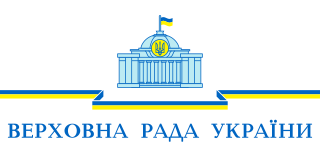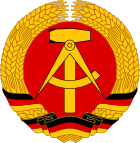
The Verkhovna Rada of Ukraine, often simply Verkhovna Rada or just Rada, is the unicameral parliament of Ukraine. The Verkhovna Rada is composed of 450 deputies, who are presided over by a chairman (speaker). The Verkhovna Rada meets in the Verkhovna Rada building in Ukraine's capital Kiev.
Regular elections in Croatia are mandated by the Constitution and legislation enacted by Parliament. The presidency, Parliament, county prefects and assemblies, city and town mayors, and city and municipal councils are all elective offices. Since 1990, five presidential elections have been held. During the same period, nine parliamentary elections were also held. In addition, there were six nationwide local elections. Croatia has held two elections to elect 11 members of the European Parliament following its accession to the EU on 1 July 2013.

Elections in Ukraine are held to choose the President, Verkhovna Rada, and local governments. Referendums may be held on special occasions. Ukraine has a multi-party system, with numerous parties in which often not a single party has a chance of gaining power alone, and parties must work with each other to form coalition governments.

Elections in Rwanda take place within the framework of a multi-party democracy and a presidential system. The President and majority of members of the Chamber of Deputies are directly elected, whilst the Senate is indirectly elected and partly appointed.

The Democratic Party of Moldova is a center-left political party in the Republic of Moldova. The party was established in 1997 and it is an associate member of the Party of European Socialists (PES) and is a full member of the Socialist International.

The German Democratic Republic was created as a socialist republic on 7 October 1949 and began to institute a government based on that of the Soviet Union. The equivalent of the Communist Party in East Germany was the Sozialistische Einheitspartei Deutschlands, which along with other parties, was part of the National Front of Democratic Germany. It was created in 1946 through the merger of the Communist Party of Germany (KPD) and the Social Democratic Party of Germany (SPD) in the Soviet Occupation Zone of Germany. Following German reunification, the SED was renamed the Party of Democratic Socialism (PDS).

The National Assembly, also transliterated as Milli Majlis, is the legislative branch of government in Azerbaijan. The unicameral National Assembly has 125 deputies: previously 100 members were elected for five-year terms in single-seat constituencies and 25 were members elected by proportional representation; as of the latest election, however, all 125 deputies are returned from single-member constituencies. Milli Majlis was the first secular republican parliament in the Muslim world.

Legislative elections were held in the German Democratic Republic on 18 March 1990. It was the only free parliamentary election in the GDR and the first truly free election held in that part of Germany since 1932. Four hundred deputies were elected to the Volkskammer.

Amirthanathan Adaikalanathan is a Sri Lankan Tamil militant turned politician and Member of Parliament. He is the leader of the Tamil Eelam Liberation Organization (TELO), a member of the Tamil National Alliance (TNA).

In Yugoslavia, elections were held while it had existed as the Kingdom of Yugoslavia, the first one being in 1918 for the Provisional Popular Legislature of Serbs, Croats and Slovenes and the last being the parliamentary election of 1938. Women were not eligible to vote. After the 1918 indirect ones, the 1920 parliamentary election was the first direct one. Parliamentary elections were held in 1923, 1925 and 1927, while with the new constitution a de facto Lower and Upper House were introduced in 1931. The 1931 elections were not free, as they were handled under a single-course dictatorship, while the 1935 and 1938 were held under limited basic democratic principles.

Legislative elections were held in the German Democratic Republic on 8 June 1986. 500 deputies to the Volkskammer were elected, with all of them being candidates of the single-list National Front. 703 Front candidates were put forward, with 500 being elected and 203 becoming substitute deputies. At its first session on 16 June, the Volkskammer re-elected Willi Stoph as Chairman of the Council of Ministers, while Erich Honecker, General Secretary of the ruling Socialist Unity Party, was also re-elected Chairman of the Council of State.

Legislative elections were held in the German Democratic Republic on 14 June 1981. 500 deputies to the Volkskammer were elected, with all of them being candidates of the single-list National Front. 679 Front candidates were put forward, with 500 being elected and 179 becoming substitute deputies. At its first session on 25 June, the Volkskammer re-elected Willi Stoph as Chairman of the Council of Ministers, while Erich Honecker, General Secretary of the ruling Socialist Unity Party, was also re-elected Chairman of the Council of State.

Legislative elections were held in the German Democratic Republic on 14 November 1971. 434 deputies to the Volkskammer were elected, with all of them being candidates of the single-list National Front. 584 Front candidates were put forward, with 434 being elected. The allocation of seats remained unchanged from previous elections.

Legislative elections were held in the German Democratic Republic on 2 July 1967. 434 deputies to the Volkskammer were elected, with all of them being candidates of the single-list National Front, dominated by the Communist Socialist Unity Party of Germany. 583 Front candidates were put forward, with 434 being elected. The allocation of seats remained unchanged from the 1963 election.

Legislative elections were held in the German Democratic Republic on 20 October 1963. They were to originally be held in November 1962 but were postponed. 434 deputies to the Volkskammer were elected, with all of them being candidates of the single-list National Front, dominated by the Communist Socialist Unity Party of Germany.

Legislative elections were held in the German Democratic Republic on 17 October 1954. There were 466 deputies to the Volkskammer in total. All were candidates of the single-list National Front, dominated by the Communist Socialist Unity Party of Germany. The list received the approval of 99.46% of voters, with turnout reported to be 98.5%.

Parliamentary elections were held in the German Democratic Republic on 19 October 1950. They were the first held since the founding of the country on 7 October 1949. There were 466 deputies to the Volkskammer in total.
Akandhan Velusami Radhakrishnan is a Sri Lankan politician and state minister. He is the leader of the Up-Country People's Front (UCPF), a member of the Tamil Progressive Alliance (TPA) and United National Front for Good Governance (UNFGG).

Jürgen Schmieder is a politician, originally from East Germany, who came to prominence during the months immediately preceding German reunification.














